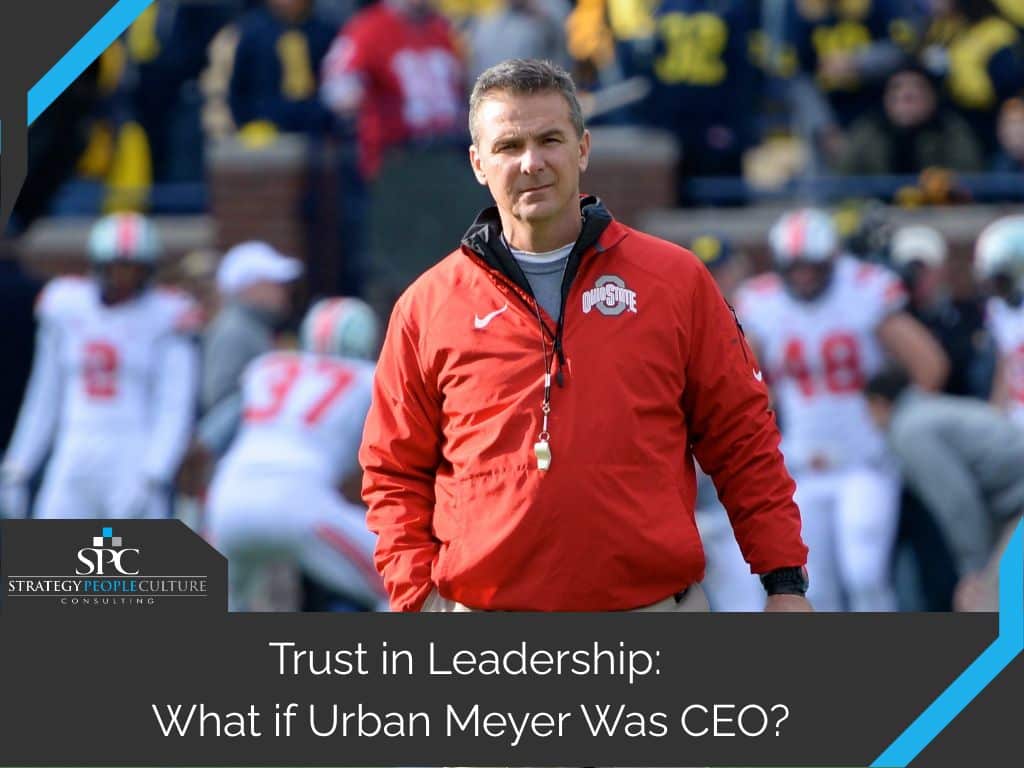Trust in Leadership: What if Urban Meyer Was CEO?

Source: MGoBlog On Flickr
Whether you follow the NFL or not, you’ve more than likely heard the name Urban Meyer in recent weeks. To give you the short version, Urban Meyer was the head coach of the Jacksonville Jaguars, who was unceremoniously fired after a series of public incidents. Nearly all of these instances compromised the organization’s trust in leadership.
As spectators, we only know what the news outlets, reporters, and social media accounts have told us. Regardless of what actually happened behind closed doors (we may never know), the court of public opinion has vilified Meyer and his leadership style.
Over the course of the 2021 NFL season, Meyer’s actions included (but weren’t limited to):
- Poor hiring decisions
- Not flying home with the team
- Having inappropriate contact with a female at a bar
- Stifling one of the team’s best players
- Referring to assistant coaches as “losers”
- Bullying the team’s kicker in practice
These actions were topped off with a 2-11 record – the second-worst in the NFL. In mid-December, enough was enough, and the organization dismissed Meyer.
But what if Meyer was the CEO or owner of the organization?
What if firing him was not an option?
If Meyer – like many other CEOs and business leaders – could not be fired, the organization would be at a precarious fork in the road: keep going down the same destructive path or seek out a professional to help Meyer become a more effective leader.
In this post, we want to dive into the hypothetical situation and what the solution(s) would be.
If The Status Quo Remained the Same
Trust in leadership is a very, very fragile thing.
Over the course of the 2021 season, organizational trust in Urban Meyer’s leadership had been periodically worn down to nearly nothing. Fortunately, the Jaguars were able to pull the plug before the situation got worse. Additionally, the high-profile nature of being an NFL franchise comes with the court of public opinion – which proved to be a major factor in Meyer’s dismissal.
Now, if Meyer had been the CEO or owner – letting him go may not have been so easy. In a smaller workplace – shielded from such open scrutiny – this may have been impossible.
Meyer was brought into Jacksonville as the head coach after an extremely successful career in college football. From what we saw play out from a public standpoint, it seems as though many of the shortcomings in Meyer’s leadership likely stemmed from an ego.
Before Meyer’s firing, the final news story was related to an incident in practice with the team’s kicker, Josh Lambo. In the report, Meyer came up to Lambo during practice and said, “Hey dipsh**, make your f**king kicks,” then proceeded to kick Lambo in the leg.
When Lambo told Meyer not to kick him, Meyer’s response was, “I’m the head ball coach, I’ll kick you whenever the f**k I want!”
Judging on news reports like this, a common conclusion would be that Meyer had an ego problem. As an executive coach with years of experience working with high-level business leaders, the common thread I’ve seen is that egos create blind spots in leadership. The bigger the ego, the more blind spots.
If the Jaguars were not able to dismiss Meyer – and these ego-related actions were allowed to go unchecked – the organization would likely continue to suffer. The environment would have become increasingly toxic, reckless, and trust in leadership between players/staff and Meyer would have gotten worse.
The most important takeaway from this hypothetical situation relates to growth. If a leader does not want help – or simply believes there is nothing wrong with their leadership style – growth will be dramatically limited.
Unfortunately many, many workplaces suffer from toxic, unchecked leadership styles.
If Meyer Had an Executive Coach to Challenge His Mindset
There are all sorts of “what if” scenarios circulating around Urban Meyer’s dismissal. To us, the biggest one relates to how Meyer may have created a more positive trust in leadership if he had an executive coach.
Working with an executive coach helps leaders become more self-aware of how their actions ripple through the organization. A big benefit of an executive coach is they are not affiliated with the workplace. In other words, they are an objective third party removed from all the politics and ego.
A leadership coach would have been there to help Meyer take a step back and look inwardly at how his actions impacted the organization, the team’s trust in leadership, and ultimately, success on the field. But, more importantly, the executive coach would help to challenge Meyer’s thought process and how he reacted to certain situations. This would benefit him both personally and professionally.
This year, a good comparison is between Urban Meyer and Dan Campbell, head coach of the Detroit Lions. Meyer and Campbell both made their debuts as NFL head coaches in 2021 – and both have similar losing records. Campbell has kept his job and will likely keep it for the next year and beyond. The difference lies in the leadership style.
As of this writing, Campbell has maintained the support of his coaching staff and the locker room. It’s clear that Campbell’s leadership aims to galvanize and lead without tyranny is the more effective approach. Campbell has earned overwhelming praise for his treatment of the team and ability to keep the roster from not quitting on the season, regardless of the record.
An executive coach could likely have helped Meyer become more self-aware of his leadership style. And more importantly, how to alter it in a way that earns support from the organization.
Lessons CEOs Can Learn from the Urban Meyer Situation
Unchecked, Unchallenged Egos Create Blind Spots
To echo a previous point, Meyer likely brought a big ego with him as he transitioned from college football to the NFL. When a leader – like a CEO or an owner – is at the top and cannot be fired, the feeling of being untouchable often spawns an ego-driven mindset.
The person in this role needs to realize they have the greatest vested interest in maximizing the success of their organization. They may not realize their mindset is counterproductive. Even highly profitable organizations may be putting a governor on even higher profitability based on their mindset limitations and approach.
Over time, if leadership’s offensive and inappropriate behavior is tolerated, it tends to feed the ego within the leader. To reiterate, egos create blind spots in empathy and how actions are perceived.
An executive coach helps these leaders examine how their ego and actions are perceived through an objective lens. Egos are not always easy to control – and it can be even more challenging to accept the help of a professional.
Executive coaching has proven time and time again to be instrumental in helping leaders critically examine their own style. These lessons in self-reflection create more effective approaches in building trust in leadership throughout workplaces.
Respect Trickles Down – and is Returned to the Top
Meyer came into the Jacksonville Jaguars head coaching job with a long list of accolades. On paper, these accolades have undoubtedly earned respect. However, it takes more than a list of accomplishments to maintain respect. Respect and trust in leadership are never set in stone – especially in a world where public opinion reigns supreme. In the long run, the respect a leader gives out is indicative of the respect that gets returned.
There are many instances in this fiasco that indicate when Meyer may have lost the respect of the organization. Perhaps the biggest incident in the timeline was a team meeting in which Meyer delivered a scathing message claiming he was a “winner” and his assistant coaches (of whom he hired) were “losers”. From here, he went around the room and insisted each coach compare their résumés to his.
The best leaders take accountability for the results (good or bad) produced by the organization. When push comes to shove, this is how respect is earned. Shifting blame is one of the quickest ways to lose it.
Executive coaching can be beneficial in helping leaders understand how their actions influence respect. Moreover, a coach can help a leader strategize tactics to earn ongoing respect and loyalty across the organization.
Setting an Example of Maturity is Part of Leadership
In addition to ego, maturity issues were a consistent theme throughout Meyer’s tenure in Jacksonville. A video surfacing of Meyer being danced on by a young woman (of whom was not his wife) in a public restaurant and complaining about assistant coaches was just a couple of instances of this.
Following Meyer’s dismissal, we’ve seen a number of NFL analysts and former players point to Meyer’s maturity as a source of the organization’s dysfunction.
Leaders have an unspoken duty to set the tone for how an organization presents itself. This is true regardless of whether it’s a small business or a global enterprise. The actions of leaders are a reflection of everyone in the organization. Executive coaching can be crucial in helping leaders bridge the cognitive gap between their actions and how it translates to a wider culture.
What It All Means
Many organizations across the world are blessed with fantastic leadership. Unfortunately, others are not as fortunate. Additionally, most of these organizations do not have the luxury of being able to fire their toxic leaders.
Hopefully, the extremely publicized Urban Meyer fiasco has served as a cautionary tale to many leaders and executives in the business world. Leaders have a responsibility to support everyone in their organization, take ownership, and maintain the ability to stay self-aware in how their actions impact the end result.
Not everyone is built for leadership roles – no matter how impressive their accomplishments are. For these people, executive coaching can be extremely beneficial in looking at situations objectively – and using their power to impact the organization positively.
Strategy People Culture specializes in helping leaders become more effective. To learn more about coaching opportunities – or the benefits, don’t hesitate to call 833-762-5772 or set up a free consultation. No organization is too big or too small to see positive results.





